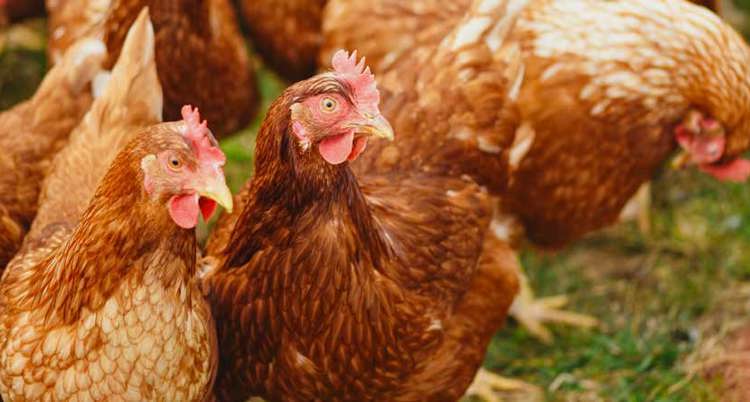The importance of good bio-security
The poultry industry is one of the largest and most important sectors of our agricultural economy. Keeping birds safe from infectious diseases is a top priority and responsibility for all owners, growers, workers, and enthusiasts involved in raising poultry. Disease outbreaks can lead to the devastation of our flocks and result in job and financial losses, quarantine restrictions limiting trade, and affecting prices on eggs, prepared poultry and other staples.

The poultry industry is one of the largest and most important sectors of our agricultural economy. Keeping birds safe from infectious diseases is a top priority and responsibility for all owners, growers, workers, and enthusiasts involved in raising poultry. Disease outbreaks can lead to the devastation of our flocks and result in job and financial losses, quarantine restrictions limiting trade, and affecting prices on eggs, prepared poultry and other staples.
Without a doubt, antibiotics offer a high level of security against the most common pathogens. Without in-feed antibiotics, however, the whole farm biosecurity protocol must be re-evaluated and most likely elevated to new standards.
Assuming that under current commercial conditions, the achieved level of health status of animals is always around “average,” we will still rely on having to use antibiotics. However, having a strict and effective biosecurity protocol in place will reduce the reliance on antibiotic solutions to treat, control or prevent disease.
What is biosecurity?
Biosecurity means doing everything you can to keep diseases out of your flock. ‘Bio’ refers to life, and ‘security’ indicates protection. Biosecurity is the key to keeping your poultry healthy. It is what you do to reduce the chances of an infectious disease being carried to your farm, your poultry yard, your aviary, or your pet birds by people, animals, equipment, or vehicles, either accidentally or on purpose. Consistent biosecurity practices are the best way to prevent bird diseases.
Biosecurity is accomplished by maintaining a site or farm in such a way that there is minimal traffic of biological organisms (viruses, bacteria, fungi, rodents, etc.) across its borders. Biosecurity is the cheapest, most effective means of disease control available. No disease prevention programme can work without it.
Biosecurity becomes increasingly important when animal or bird numbers on a site increase or when stocking densities increase. It also plays a role when the number of sites or farms in an area increases or when the value of the animals is high.
Diseases can be transmitted within a site in several ways:
- Carrier birds within a flock.
- Recently acquired birds. Sometimes, these birds appear healthy, but they may have recovered from the disease and are now carriers.
- Eggs from infected birds.
- Human feet, hands, and clothes.
- Dust, feathers, and manure on equipment and supplies such as bedding.
- Feral birds, predators, rodents, flies, and insects.
- Contaminated feed and feed bags.
- Dirty water.
Of all these factors, the introduction of new birds and traffic on and off the site (particularly people) pose the greatest risk to bird health on any farm. Properly managing these two factors should be a top priority on your farm. New birds represent a threat because their disease status is unknown. They may have an infection, or, equally importantly, they may be susceptible to an infection that is already present in birds that appear normal (healthy carriers) on your farm.
An effective biosecurity programme can only be achieved by focusing on all the farms' systems.
Isolation
Isolation refers to the confinement of animals within a controlled environment. A fence keeps your birds in, but it also keeps other animals out.
Use a different pair of shoes in the isolation area and in the resident bird area to prevent the mechanical transfer of disease organisms on shoes. Footwear should be disinfected at each site. Footbaths may help to decrease the number of organisms on boots.
Wash your hands before and after working with poultry. In addition to potentially spreading disease from farm to farm or bird to bird, you can also spread germs such as Salmonella that can impact human health. Wash with soap and water (always your first choice). If using a hand sanitiser, remove manure, feathers and other materials first because disinfectants will not penetrate organic matter or caked-on dirt.
Establish a ‘clear zone’ free of vegetation around buildings to discourage rodent and insect traffic into the buildings.
Traffic control
This aspect includes both the traffic coming onto your farm and the traffic patterns within the farm. It refers to the movement of both people and vehicles. Biosecurity generally requires human traffic control, such as locking the doors and banning all visitors or allowing entry to certain authorised and necessary personnel only after they have put on clean clothing but, most importantly, clean footwear.
Unfortunately, the greatest threat to your biosecurity is visits from other poultry producers. There is no need to make a real issue of this – simply ask them to shower and put on clean clothing when they visit you. Provide them with clean footwear. It is for this reason that most large poultry companies insist that their staff do not keep birds at home.
Protective clothing and other measures
Visitors should wear protective outer garments or disposable coveralls, boots and headgear when handling birds and showers and/or change clothes when leaving the facility.
If using a footbath, be sure to remove all droppings, mud or debris from boots and shoes using a long-handled scrub brush before stepping into the disinfectant footbath. Keep the footbath clean and replenish the disinfectant regularly.
Clean and disinfect any tools or equipment before moving them to a new poultry facility or before allowing service vehicles, trucks, tractors or tools and equipment, including egg trays and boxes, to enter or exit the property. Make sure they are cleaned and disinfected to prevent contaminated equipment from transporting disease. Items that cannot be cleaned and disinfected, such as cardboard egg box flats, must not be moved or reused.
Openings in buildings should be screened with a properly sized protective mesh to keep out birds or rodents. Grass and bushes should be kept trimmed for at least a metre on each side of the fence. This will allow the detection of burrowing rodents as well as force any predators to approach the fence without the benefit of cover.
Sanitation
Sanitation refers to the general cleanliness of the site. It also addresses the disinfection of materials and equipment entering the farm and the cleanliness of the personnel on the farm.
Plan periodic cleanout, clean up, and sanitation of facilities and equipment. It is suggested that this be diarised to be carried out regularly (i.e. every six weeks). Disinfect drinkers and feeders regularly. For young birds, this should be carried out daily, whereas once a week is probably adequate for mature birds. Remember that drying and sunlight are very effective in killing many disease-causing organisms.
To disinfect a poultry house or farm, follow these steps.
First, clean
- Remove all bedding, feed, feeding equipment, and manure.
- Sweep out loose dirt, cobwebs, etc.
- Scrub all surfaces with a detergent.
- Rinse all detergent and organic matter from surfaces using hot water.
- A steam or high-pressure water cleaner will be helpful for steps 3 and 4.
Next, sanitise
- Apply the disinfectant.
- Allow the disinfectant to dry completely.
- Replace any bedding with fresh materials.
- Disinfect any new bedding with a disinfectant
- Rinse all water and feeding equipment before refilling them.
Lastly, keep it clean
- Have a regular cleaning schedule.
- Remove any dead birds immediately.
- Use a long-lasting disinfectant weekly.
Choosing the right products to use to both wash and disinfect your facilities is important. You will need to consider several characteristics that could include efficacy (killing efficiency against viruses, bacteria, and fungi), activity with organic matter, and toxicity (relative safety to animals). There is a wide range of different products on the market.
Site planning
Security is key. Fortunately, all the steps that need to be taken to ensure that theft does not occur are also ideal for biosecurity. Things like restricted access and a single, controllable entrance are key.
Traffic flow on any farm is important. The reason for this is that young birds are most susceptible to diseases, while older birds will usually have developed some degree of immunity to the most common diseases. In addition, older birds may be carriers of disease. Direct the flow of human traffic from youngest birds to oldest birds.
Get your checks in place.
Always practice good biosecurity to ensure that your flocks remain healthy and free of disease. Following a checklist will help you to be consistent in your biosecurity practices. Put these checklists up in your poultry houses as daily reminders to practice good biosecurity. Below are several suggested checklists that should be compiled.
- Checklist for cleaning and disinfecting poultry enclosures.
- Checklist for equipment and vehicles.
- Checklist for personnel and visitors.
- Checklist to protect against wild birds, rodents, and insects.
- Checklist for adding or replacing poultry.
By taking a few very simple steps, it is possible to greatly reduce the risk of disease threat to your birds. In turn, this will reduce the need to treat sick birds with antibiotics or to use antibiotics as a tool to prevent or control infections.
Biosecurity is also a courtesy. When practised properly, it will help keep producers and neighbours out of trouble. Disease control is, in part, being responsible and ethical to others. Don’t visit your friends if you suspect that you may have a problem in your back yard. Respect other poultry farmers who ask you to comply with their own set of biosecurity rules, even if this means you cannot see their animals.
